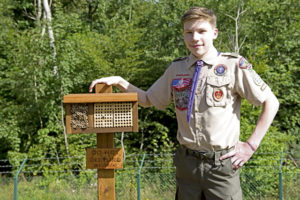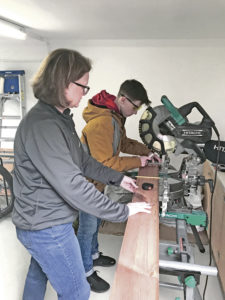One Ramstein Boy Scout has a message for solitary bees: It’s time to check out of the ground and check-in to a hotel.
Over the past three years, the 86th Civil Engineer Squadron pest management office received numerous requests for the extermination of bees in playgrounds and park areas. Parkgoers raised concerns about bees burrowing holes in the playground and endangering children at play.
However, this type of bee, known as solitary bees, are a protected species in Germany and they cannot be disturbed. Unlike honeybees, solitary bees do not make nests or honey and lack a queen to defend. Their main job is pollination and procreation. Roping off areas with bees was the only viable option for pest management, a stinger that remained for years.

Enter Carter Young, a Ramstein Boy Scouts Troop 156 life scout, with the solution. Young proposed his idea to the pest management office:, a shelter for bees called a Bee Hotel.
A long-time lover of insects, Young came up with his Eagle Scout idea after seeing insect hotels at Chièvres Air Base, Belgium.
”I thought it was really cool that I could see live insects in something that someone could build,” Young said.
Young himself has been a victim of bee attacks. In first grade he stepped on one of their nests in the ground and aggravated the bees resting there.
“Now he’s built something that makes [playgrounds] a safe place to be so hopefully another kid won’t come across something in the ground accidentally,” Glenda Young, Carter’s mother, said.
With the help of his family and the other Boy Scouts, Young bought materials and crafted shelters for the bees to live in. Bee hotels are generally wooden structures occupied with recyclables. The materials protect bees from predators as well as natural elements.

Staff Sgt. Arielle Howze, 86th CES pest management technician, worked as a liaison for the scouts, gaining approval from various agencies to place the hotels on their property.
“Carter built this on his own,” Howze said. “He’s great with woodwork and came up with all the ideas and plans. I just facilitated with the different agencies and gave him some advice.”
Planning for the project began in November 2019. The project ran into some struggles coordinating with agencies during COVID-19, but the wooden structures were completed and installed in July 2020.
The four bee hotels are stationed at Ramstein Elementary, Middle, and High schools and in the housing area.
Bee hotels only attract bees that already live in the area, encouraging them to use the hotel instead of burrowing holes in the ground and endangering children at playgrounds. Solitary bees are welcome for a staycation after a busy day of pollinating.
Young’s family will be leaving Germany soon, and he’s proud to have his own legacy to leave at Ramstein.
“I’ve lived here for six years and haven’t really done anything for the community before, so I think this is pretty cool,” Young said.


